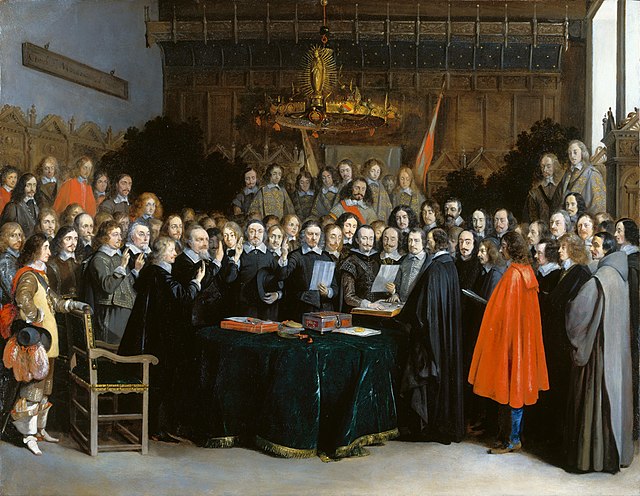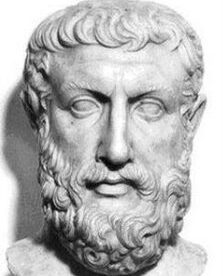
Westfaelischer Friede in Muenster (Gerard Terborch 1648)
Beneath the blatant anti-White blood libels of “anti-imperialist” and “anti-colonialist” thought and rhetoric lies a critical yet often unexamined flaw. For the edification of my readers, I will elucidate this flaw, which I have termed the “Westphalian Fallacy”.
Why is this fallacy “Westphalian”? The answer is found in the history of the Thirty Years’ War, and the concept of international relations which have emerged from it. In the article “Westphalian state system” in the Oxford Reference, one finds the following definition:1
Term used in international relations, supposedly arising from the Treaties of Westphalia in 1648 which ended the Thirty Years War. It is generally held to mean a system of states or international society comprising sovereign state entities possessing the monopoly of force within their mutually recognized territories. Relations between states are conducted by means of formal diplomatic ties between heads of state and governments, and international law consists of treaties made (and broken) by those sovereign entities. The term implies a separation of the domestic and international spheres, such that states may not legitimately intervene in the domestic affairs of another, whether in the pursuit of self‐interest or by appeal to a higher notion of sovereignty, be it religion, ideology, or other supranational ideal. In this sense the term differentiates the ‘modern’ state system from earlier models, such as the Holy Roman Empire or the Ottoman Empire.
(Coggins, Richard. “Westphalian state system.”)
Considering the nature of this development in international theory, it must first be admitted that the Westphalian state concept and system is uniquely a European one. It was the result, though unknown to the men signing these treaties, of the most brutal war in European history at that time. Despite the fact that this conflict had fought primarily on religious grounds been in the beginning, towards its end it took on a more geopolitical significance, particularly with France entering the war to aid the Protestant League. This war ended in stalemate for both the Catholic and Protestant factions; therefore, there had to be compromise in order to guarantee peace. Yet, this compromise came at the cost of shoving the Church out of civil affairs to a further degree than it had been done before, by the admission of the formula cuius regio, eius religio.2 As Fr. Guggenberger notes, this settlement “contained numerous violations of the rights of the Church” and that “Leo X protested against it in his bull Zelus domus Dei; but he did not blame [Emperor] Ferdinand III., who had endeavored to save what could be saved.”3
The authority of the prince, or the ruler, became the determinant of the religion of his citizens. This meant that, in principle, the authority of the state was raised above the authority of the Church, even in the Catholic countries. In medieval times, the Church had sanctioned the existence of the State, represented in such actions as the crowning of Charlemagne by Pope Leo III and the usage of holy oils to consecrate the kings of Christendom in their coronation ceremonies. Now, affairs were increasingly turning in the other direction, as the dream of reestablishing the Catholic unity of the Holy Roman Empire—that wonderful Germanic son of Charlemagne—was seemingly crushed, and irreversibly so. The religious unity which Western Europe enjoyed in the Middle Ages, with its diverse assortment of small and large states under the authority of the Roman Pontiff, was now signed away in favor of the Westphalian system. As the Europeans expanded their dominion to new lands, this new system of state relations therefore traveled with them.
What then is the “fallacy” at work in the “Westphalian Fallacy”? The fallacy is precisely this: it is nonsensical to apply a relative, European concept of the state to non-European peoples in an objective manner, pretending that these peoples understood their governments in these foreign terms, and to then engage in moralizing about how “wrong” it was for Europeans to “violate” the Westphalian “sovereignty” of non-European tribes and states to which this same concept was entirely alien. Of course, there are too many cases to bring forth to provide that the Westphalian concept only became believed in by non-Europeans as a result of European colonization and imperialism, but two simple examples will suffice.
The Chinese, for instance, had a long history of utilizing the tributary system, spanning from the time of the Han dynasty to the Qing dynasty—well over a thousand years! Integral to this system of international relations was the concept that the Chinese emperor, as the leader of the prestigious Middle Kingdom, was worthy of routine tribute by its neighbors. In granting tribute, the lesser nation was considered a vassal state to the emperor, as Britannica states:4
This system expressed the Chinese emperor’s belief that China was culturally and materially superior to all other states, and it required those who wished to trade with or otherwise interact with China to approach the emperor as his vassals, acknowledging him to be the ruler of “all under heaven.”
(“Tributary System.” Britannica.com.)
Such a concept developed naturally and became deeply ingrained in the Chinese mind; so why then judge the Europeans who would later come to dominate the Qing empire in Westphalian terms, and not in these terms that were organic to the Chinese culture? Do those who engage in this charlatan enterprise believe, despite their apparent hatred of Europeans and their civilization, that the Westphalian system is somehow objectively superior to all other possibilities? Perhaps some may argue that these “intellectuals” are simply attempting to judge Europeans by their own standards. Yet, there is a major problem with this; Europeans did not see non-Europeans as belonging to the Westphalian system. How could they otherwise, given that the Westphalian system was meant to apply only to the governance of European states, and the balance of power among European nations in the European continent?
This fallacy only gets more egregious when it is applied to the Africans, particularly the Sub-Saharan Africans who mostly lived in small localized tribal entities before they were incorporated into European empires. To the contradiction of “historians” and “intellectuals” who attribute a Westphalian perspective of the nation to these peoples, presupposing that the majority among them were “outraged” to be governed by Whites, the evidence swings in quite the other direction. How else can one account for the simple fact that, in the case of France for instance, the overwhelming majority of the soldiers who carried out the work of conquering two thirds of the Dark Continent for that nation were African volunteers?5 The submission which Africans tended to exhibit towards their European conquerors was not unique to them; in fact, willingly submitting to a superior nation without a thought of revanchism is far more universal to humanity than the Westphalian system ever was, or could be.
In closing, the ignorance of the “anti-imperialists” and “anti-colonialists” is further demonstrated by their usage of this absurd fallacy in their attacks against the Europeans peoples, their civilization, and even the Holy Catholic Church, which sanctioned the colonization and evangelization of those who had hitherto lived in the darkness of paganism. Our enemies are motivated by an illogical fideism which is moved by sophistry and spite, the startling yet logical antithesis to our faith, which operates in tandem with reason and charity. Moreover, in considering the history of the Westphalian state system, it must be realized that the moral value of such state systems are relative—true for one set of peoples, but not for another. It is true that we owe honor to our own nations as a part of the Fourth Commandment; yet we are not commanded by God to pay ideological fealty to any given theory of international relations.
-
Coggins, Richard. “Westphalian state system.” Oxford Reference.
https://www.oxfordreference.com/display/10.1093/oi/authority.20110803121924198.
-
“Cuius regio, eius religio.” Oxford Reference.
https://www.oxfordreference.com/display/10.1093/oi/authority.20110803095652429.
-
Guggenberger S.J., Fr. Anthony. A General History Of The Christian Era – For Catholic Colleges And Reading Circles And For Self-Instruction, Volume 2: The Protestant Revolution. p. 344.
https://archive.org/details/AGeneralHistoryOfTheChristianEraV2/page/n1/mode/2up.
-
“Tributary System.” Britannica.com.
-
See for reference:
“I DEBUNK Woke History Lesson about Colonialism.” HistoryLegends. YouTube, 9 Apr. 2023.
